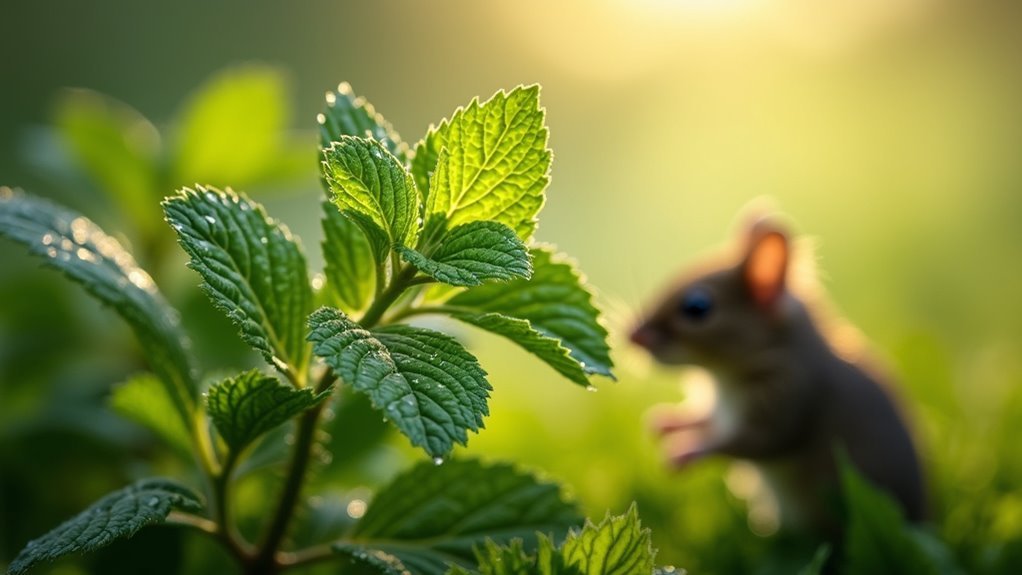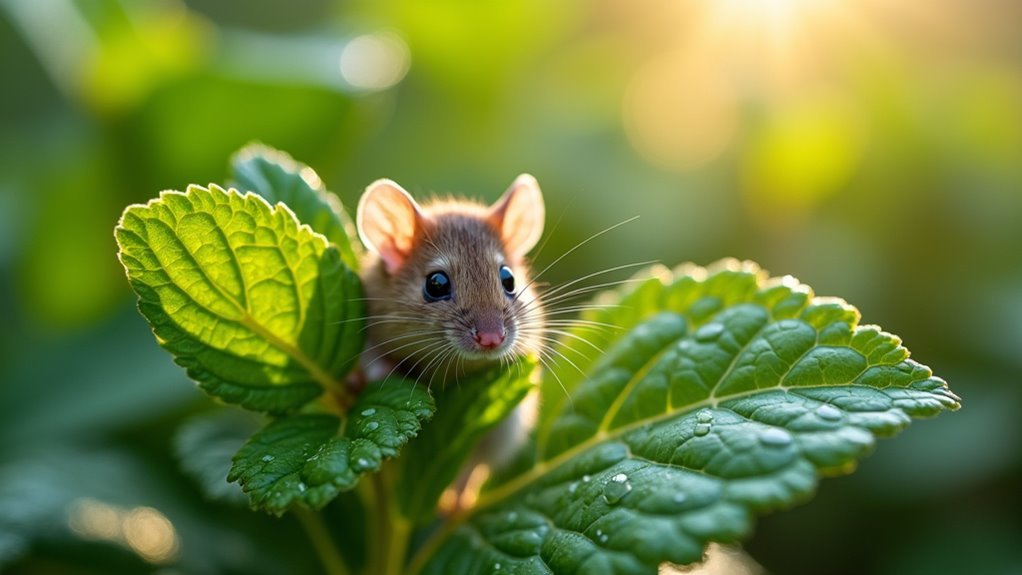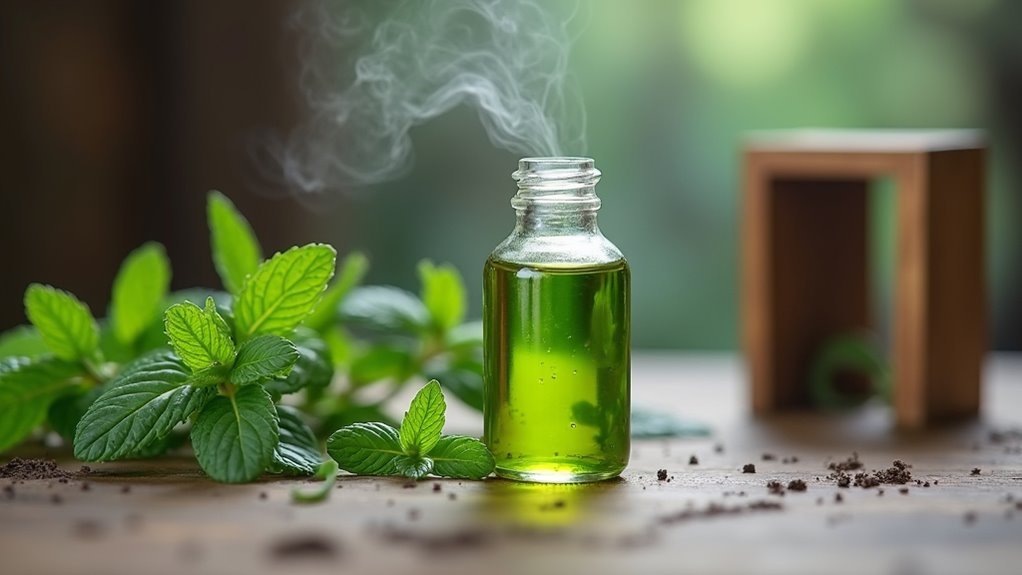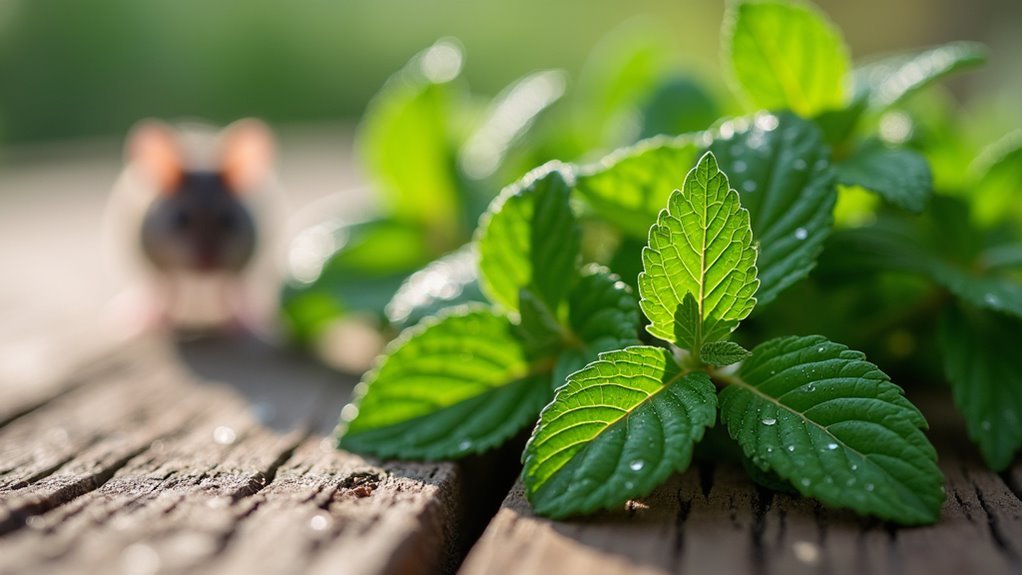Peppermint oil repels mice because its high menthol content creates intense irritation in their extremely sensitive nasal cavities. You’re fundamentally exploiting mice’s greatest strength – their extraordinary sense of smell – as their weakness. The strong peppermint scent overwhelms their olfactory navigation system, masks essential pheromone trails they use for communication, and causes sensory overload that forces them to retreat from treated areas. This disrupts their ability to detect food sources and identify dangers effectively. Understanding these mechanisms will help you apply this natural deterrent strategically.
How Mice Rely on Their Sense of Smell for Navigation

Survival in the wild depends heavily on a mouse’s extraordinary sense of smell, which serves as their primary navigation system.
A mouse’s remarkable olfactory abilities function as nature’s most sophisticated navigation system for wilderness survival.
You’ll find that mice can detect scents at incredibly low concentrations, allowing them to locate food sources and identify potential dangers with remarkable precision. Their olfactory system acts like a sophisticated GPS, helping them follow pheromone trails left by other mice to discover resources and establish territorial boundaries.
When you understand how essential smell is for mice communication and foraging, you’ll see why peppermint oil works so effectively as a repellent.
The strong scent overwhelms their delicate olfactory receptors, disrupting their ability to sense critical pheromones and navigate confidently through their environment, ultimately causing them to avoid treated areas entirely.
The Science Behind Peppermint Oil’s Active Compounds
Menthol stands as the primary weapon in peppermint oil’s arsenal against mice, acting as a powerful irritant that targets their sensitive nasal cavities. This compound creates an uncomfortable environment that forces mice to retreat from treated areas.
The strong scent of peppermint oil overwhelms their highly developed olfactory senses, disrupting their natural communication systems.
You’ll find that peppermint oil’s effectiveness comes from its ability to mask essential pheromone trails mice depend on for navigation and food location.
The potent aroma confuses their smell receptors, making it difficult for them to orient themselves properly. This disorienting effect proves vital in your efforts to repel mice, as they can’t function effectively when their primary sense becomes compromised by the oil’s powerful compounds.
Why Strong Scents Overwhelm Mice’s Sensory Systems

When you consider a mouse’s survival strategy, their extraordinary olfactory capabilities become both their greatest asset and most vulnerable weakness. Strong scents like peppermint oil exploit this vulnerability by overwhelming mice’s sensory systems completely.
The overpowering smell of menthol creates intense irritation in their nasal cavities, causing immediate discomfort that forces them to retreat. This sensory overload disrupts their ability to detect essential environmental information they need for survival.
Peppermint oil’s concentrated aroma interferes with natural pheromone detection, confusing navigation systems mice depend on daily. When their sensitive noses can’t distinguish between familiar food scents and safety markers, they become disoriented and stressed.
The result is complete avoidance of areas where these potent scents are present, making peppermint oil an effective natural deterrent.
How Peppermint Oil Disrupts Mouse Communication Pathways
When you apply peppermint oil in areas where mice travel, you’re fundamentally jamming their communication network by masking the pheromones they use to mark safe pathways.
The oil’s potent aroma overwhelms these chemical signals that mice depend on to navigate and share information about food sources, nesting sites, and potential dangers.
You’ll disrupt their established scent trails, forcing them to avoid treated areas since they can’t rely on their usual navigation system.
Pheromone Masking Effects
Since mice depend heavily on pheromone communication to navigate their environment and maintain social connections, peppermint oil’s potent aroma creates significant disruption in their chemical messaging system. When you apply peppermint oil, its strong scent overwhelms mice’s sensitive olfactory receptors, causing immediate irritation and confusion. The oil effectively acts as a masking agent, covering up the natural pheromones mice use for territory marking and danger signals.
| Pheromone Function | Without Peppermint Oil | With Peppermint Oil |
|---|---|---|
| Territory Marking | Clear chemical boundaries | Masked, confusing signals |
| Navigation Routes | Established pathways | Disrupted directional cues |
| Social Communication | Effective interaction | Blocked messaging system |
| Danger Detection | Quick warning signals | Overwhelmed alert system |
This masking effect transforms treated areas into unsuitable environments, making peppermint oil an effective deterrent against mouse infestations.
Scent Trail Disruption
Beyond masking individual pheromones, peppermint oil completely dismantles the intricate scent trail networks that mice depend on for daily survival.
When you apply peppermint essential oil in areas where you’ve noticed mice activity, you’re fundamentally erasing their invisible highway system. The scent of peppermint overwhelms their strong sense of smell, making it impossible for them to follow established pathways to food sources and nesting sites.
This disruption forces mice to abandon familiar routes they’ve used for generations. Without these scent markers, they can’t efficiently navigate your home or communicate locations to other mice.
The potent aroma doesn’t just disrupt communication temporarily—it creates lasting confusion that makes your treated areas inhospitable to future infestations.
The Difference Between Deterring and Eliminating Mice

While peppermint oil can create an unwelcoming environment for mice, there’s an essential distinction between deterring them and eliminating an existing infestation.
Deterring mice involves making spaces unpleasant through scents like peppermint oil that irritate their smell and disrupt communication pathways. However, eliminating mice requires addressing root causes like sealing entry points and removing food sources.
Peppermint oil works best as a preventative measure for mouse control, temporarily keeping mice away from specific areas. Once mice establish nests, they’ll often ignore the scent after becoming acclimated.
For lasting results, you’ll need thorough approaches that combine peppermint oil with trapping and habitat modification. Understanding this difference helps you set realistic expectations and develop effective long-term pest management strategies.
Proper Application Methods for Maximum Effectiveness
You’ll need to master three key application methods to get the most out of peppermint oil as a mouse deterrent.
The concentration of your spray solution, strategic placement of cotton balls, and timing of reapplications all directly impact how well this natural repellent works.
Getting these fundamentals right means you’re far more likely to keep mice away from your home effectively.
Cotton Ball Placement Strategy
Five strategic locations determine the success of your peppermint oil cotton ball placement.
First, position cotton balls at entry points like gaps around doors, windows, and baseboards where mice typically enter your home.
Second, place them in areas where you’ve observed mouse activity to create a strong scent barrier.
Third, distribute multiple cotton balls throughout spaces prone to rodent problems, ensuring consistent peppermint coverage.
You’ll need to replace the soaked cotton balls every few days as the aroma diminishes over time.
For maximum effectiveness, combine this placement strategy with sealing visible entry points to prevent mice from returning.
The key is maintaining fresh peppermint oil concentration while targeting both current activity zones and potential access routes to successfully deter mice from your property.
Spray Solution Concentration
Creating an effective peppermint oil spray requires precise concentration ratios to maximize mouse-repelling properties. When using peppermint oil to deter unwanted rodents, you’ll want to make sure your mixture contains two teaspoons of 100% peppermint oil per cup of water.
| Ingredient | Amount |
|---|---|
| Peppermint Oil | 2 teaspoons |
| Water | 1 cup |
| Dish Detergent | 3-5 drops |
| Spray Bottle | 1 container |
| Application Frequency | Every few days |
Adding dish detergent helps the solution adhere better to surfaces. Spray the solution around entry points like doors and windows to control mice effectively. This peppermint oil spray concentration creates a potent barrier that mice find overwhelming, forcing them to seek alternative locations away from your home.
Reapplication Frequency Guidelines
While proper concentration guarantees your peppermint oil spray works effectively, maintaining that potency requires consistent reapplication schedules.
You’ll need to reapply your peppermint oil repellent every 1-2 weeks since the scent diminishes naturally over time. Place cotton balls soaked in peppermint oil throughout high-traffic areas where mice frequent, replacing them weekly for maximum effectiveness.
You must refresh applications more frequently after rain or cleaning, as moisture dilutes the scent’s strength. Always shake your spray mixture thoroughly before each application to guarantee even oil distribution.
Monitor these areas regularly and don’t rely solely on peppermint oil—combine it with sealing entry points for enhanced results. Consistent maintenance keeps your natural repellent system working at peak performance against unwanted rodent visitors.
Limitations of Peppermint Oil as a Standalone Solution
Although peppermint oil shows promise as a natural mouse deterrent, it comes with significant limitations that prevent it from being a complete pest control solution.
You can’t rely on peppermint oil alone to keep mice out of your home. It won’t eliminate existing infestations or address areas where mice have already established nests. The effectiveness varies dramatically between products, and mice adapt to the scent over time, reducing its deterrent power.
| Limitation | Impact |
|---|---|
| Ineffective against established infestations | Mice in your home won’t leave |
| Variable formulation strength | Inconsistent results across products |
| Mice develop tolerance | Reduced long-term effectiveness |
| Doesn’t address root causes | Entry points remain unsealed |
Using oil deter methods without complementary strategies like sealing gaps and setting traps prolongs infestations and wastes valuable time.
Combining Peppermint Oil With Other Pest Control Strategies
Understanding these limitations doesn’t mean you should abandon peppermint oil entirely. Instead, you’ll achieve better results by combining it with other pest control strategies.
Start by using peppermint oil alongside physical barriers—seal entry points with steel wool or caulk to prevent mice from entering your home. Place traps near areas where you’ve applied peppermint oil to improve catch rates, as the scent can direct mice toward these devices.
Combine peppermint oil with physical barriers and strategic trap placement to create a comprehensive mouse control system that maximizes effectiveness.
Eliminate food sources through deep cleaning practices while maintaining fresh peppermint oil applications every few days.
For thorough pest management, consider working with a pest control professional who can integrate peppermint oil into a broader treatment plan, ensuring more effective long-term results against mouse infestations.
Frequently Asked Questions
Is It True That Peppermint Oil Keeps Mice Away?
Peppermint oil can deter mice by overwhelming their scent-based navigation and irritating their nasal cavities. However, you’ll find it’s more effective for prevention than removing established infestations, requiring regular reapplication.
How Long Does It Take Peppermint Oil to Get Rid of Mice?
You’ll notice peppermint oil can start deterring mice within days, but it won’t eliminate established infestations. You’ll need consistent reapplication and thorough pest control methods for complete removal.
How Do You Make Peppermint Oil Mouse Repellent?
You’ll mix two teaspoons of 100% peppermint oil with one cup of water in a spray bottle. Apply to doorways, windows, and baseboards, or soak cotton balls for targeted placement.
Is There a Difference Between Peppermint Oil and Peppermint Essential Oil?
You’ll find peppermint essential oil is more refined and potent than regular peppermint oil. Essential oil contains higher menthol concentrations, making it more effective for mouse repelling, though both work similarly.
In Summary
You’ll find that peppermint oil works by overwhelming mice’s sensitive olfactory systems, disrupting their ability to navigate and communicate effectively. While it’s a natural deterrent that can help keep mice away when applied properly, don’t expect it to eliminate an existing infestation on its own. You’ll get the best results when you combine peppermint oil with other pest control methods like sealing entry points and maintaining a clean environment.





Leave a Reply